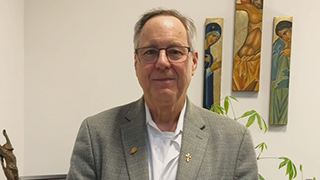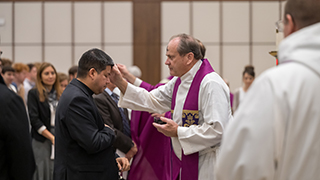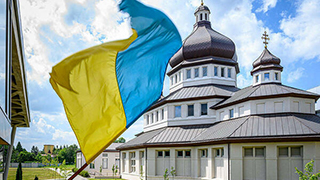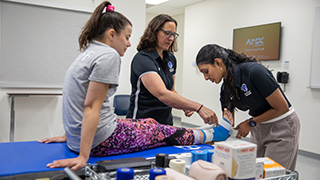English Lecturer Gregory Iannarella Opens Exhibit at Yogi Berra Museum and Learning Center
Wednesday, April 24, 2024
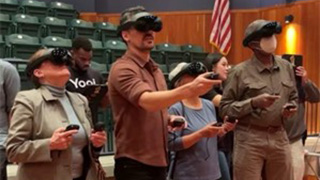
Photo by Thomas E. Franklin depicts attendees using the virtual reality feature of the exhibit.
Gregory Iannarella, lecturer of English and coordinator of business writing, has served for two years as resident Humanities Scholar for the Yogi Berra Museum & Learning Center, helping to develop data-driven content for a new exhibition that leverages our national pastime, and specifically the 2020 baseball season, to explore our collective social experience of the pandemic. Four years and one month after the COVID-19 outbreak, Handling the Curve: COVID-19 and Major League Baseball, opened at the Yogi Berra Museum & Learning Center on Wednesday, April 17th, 2024, including powerful data narratives developed by Iannarella.
Over the last two years, Iannarella has combined his passion with his craft as he has helped develop a new means for viewers to manage and consume data. By pairing his ability to tell compelling stories, his knowledge in data sciences and visualization, and grants from the New Jersey Council for the Humanities, Iannarella has been working to "build an exhibit that utilizes data narration and augmented reality to tell the fascinating story" of how the COVID-19 pandemic impacted Major League Baseball. The exhibit Iannarella helped curate ultimately underscores the mutual importance of story-telling and data analysis to any modern field of work and study.
After receiving his M.A. in English from Seton Hall, Professor Iannarella went on to teach English courses at the University. Along the way, he discovered an underlying and complementary passion for studying data sciences. This discovery inspired Iannarella to enroll in data science classes offered at Seton Hall, which offers a graduate-level M.S. in Data Science as well as an undergraduate Minor in Data Visualization and Analysis, which can be combined productively with any other undergraduate major at the University.
During his studies, Professor Iannarella saw a gap in the way that data was being communicated. Instead of trying to force readers to conceptualize large quantities of data, Professor Iannarella saw an opportunity to communicate difficult data concepts by way of stories through data narration. He felt that large data concepts of COVID-19 reduced the wide-sweeping human narrative to often incomprehensible numbers. "Data analysis and narrative needed to work hand in hand to help people understand the invisible forces shaping the world—infection rates, supply chains, mortality rates—these are big concepts and difficult to grasp without contextualization," says Iannarella, "People were scared and confused. I think Narrative can help with that. Handling the Curve tells just that kind of important story, offering real-world application for the kinds of visualization tools our students are learning about in the classroom."
The need for data narration led Professor Iannarella to begin teaching this discipline in his business writing and college English classes. Professor Iannarella teaches students how to tell stories through data narration by using a wide array of interesting data sets that address issues that matter to students.
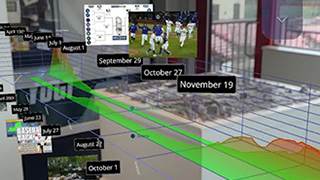
Photo by Thomas E. Franklin depicts the Flow Immersive portion of the exhibit.
Subsequentially, the Yogi Berra Museum & Learning Center expressed its need for someone with the ability to communicate the effects that the COVID-19 Pandemic had on the various aspects that impact Major League Baseball. After examining a wide range of statistics, public health findings, and putting to use Meta virtual reality headsets donated by Nestle Purina, Professor Iannarella and the museum have been able to bring this data to life as a mixed reality experience. The museum has leveraged the technology of Flow Immersive, 3D printing, data visualization, and data mapping to illustrate the effects of COVID-19 on Major League Baseball and the communities around them. Viewers can wear Virtual Reality headsets or use an iPad to visually see what happened to the communities affected.
The exhibition also includes artifacts and photographs from major league teams and oral histories from the NYC COVID-19 Oral History, Narrative, and Memory Project based out of Columbia University, documenting the lived experience of the pandemic in communities that were hardest hit. The focus of the exhibition will be on Yankee Stadium, where Yogi Berra made his name, situated in the Bronx, the New York City borough described in 2020 as the "ground zero of ground zeroes" for COVID-19. Through the ballpark and its surrounding community, the exhibition closely examines systemic health inequities laid bare by the pandemic, including how and why COVID-19 disproportionately impacted low-income communities of color. "Just as sports represents a shared culture that connects us all, the global pandemic connected us in unprecedented ways," said Eve Schaenen, Executive Director of the Yogi Berra Museum & Learning Center. "The Museum is committed to leveraging the common ground baseball offers to create a safe space for the challenging conversations we hope Handling the Curve will inspire. We're incredibly grateful to Greg for helping us bring the ideas in this exhibition to life with such enormous impact."
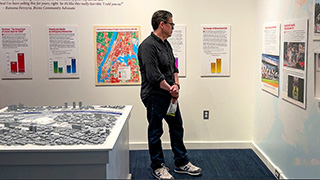
Photo by Thomas E. Franklin features an exhibit visitor.
After this project, Professor Iannarella hopes that there will be a larger platform for data to be contextualized and tell a story. Though data is continuously being produced, it is not being communicated in a way that is tangible for the public to understand. Data alone is not meaningful, and students of all levels need to hone skills in interpreting it, discerning its import, and articulating the meaning it holds. Professor Iannarella teaches these skills in his innovative writing courses, as Seton Hall always aspires to integrate technology even into the humanities classroom. As data narration and data journalism is an up-and-coming genre, projects like the Handling the Curve: COVID-19 and Major League Baseball exhibit help to highlight the importance of being able to translate the patterns revealed by large data sets in impactful visuals and narratives that empower people to act on them. Overall, Iannarella’s work with the Yogi Berra Museum illustrates the new opportunities available when students choose to combine their passions for studying humanities with their interests in STEM-related fields. Students interested in data science at Seton Hall can learn more here. Students interested in studying English and writing at Seton Hall can learn more here.
Handling the Curve: COVID-19 and Major League Baseball was made possible by a grant from the New Jersey Council for the Humanities, a state partner of the National Endowment for the Humanities. Any views, findings, conclusions, or recommendations expressed in this exhibition do not necessarily represent those of the National Endowment for the Humanities or the New Jersey Council for the Humanities.
Categories: Education



